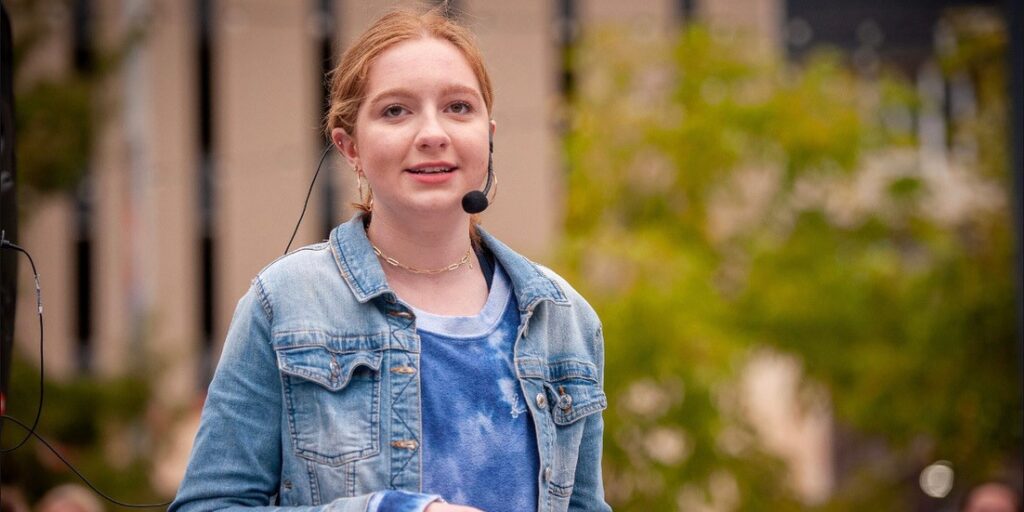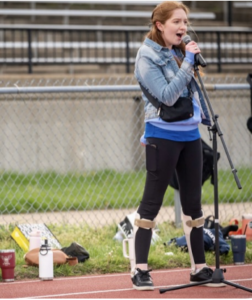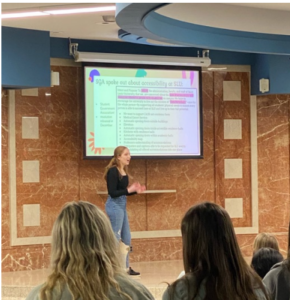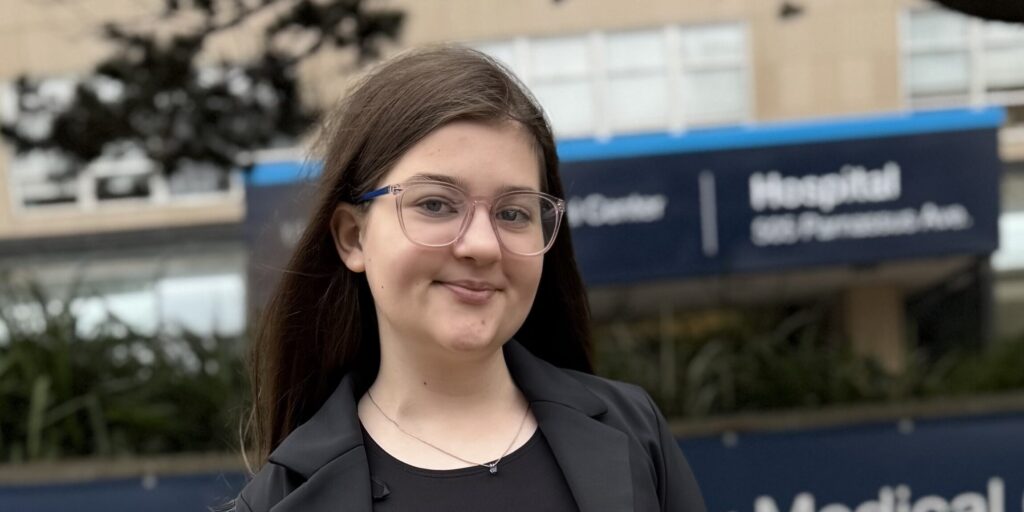
MDA Ambassador Guest Blog: Navigating Disability Advocacy on My College Campus
By Grace LoPiccolo | Monday, July 24, 2023
5 Second Summary
MDA Ambassadors play an essential role in furthering MDA’s mission while representing and empowering the neuromuscular disease community. Quest Ambassador Guest Blog series provides a platform to share their personal stories, perspectives, and experience.
Read more personal stories from members of the neuromuscular community about their College Experience as they share their journey, accomplishments, advice for accommodations and overcoming barriers, and insights into navigating college life with a disability.

MDA Ambassador Grace LoPiccolo
MDA Ambassador Grace LoPiccolo, 20, of St. Louis, Missouri was diagnosed with CMT-1A at the age of nine. She currently attends Saint Louis University majoring in Bioethics and Health Studies, and minoring in Catholic studies and Biology. She is currently a rising sophomore but ultimately plans on attending medical school and pursuing a field in neuromuscular disease clinical research.
Upon finding out I had Charcot Marie Tooth, I hid it from my peers. I didn’t want anyone to know I was different. That option got thrown out in 6th grade when I started wearing knee braces for patellar instability. My disability became visible. It became even more visible in 8th grade when I had two knee surgeries and began wearing AFOs for ankle stability. There was no hiding all that so I began to accept it. I make that sound very simple but believe me that the acceptance that your physical body is working against you is something I still struggle with today.
MDA summer camp was the first time I really began to accept my disability. Having a community of peers at camp that have similar experiences is comforting. It makes your problems feel smaller because other people are going through it with you. MDA camp is where I grew my confidence and learned how to advocate for myself and others. I began to speak at MDA and Burn Boot Camp events in order to share my story with that community.
Once I landed on Saint Louis University as my college, I began to get excited but also felt self-doubt and anxiety. I feared that my body would not keep up with the dreams that my mind thought up. I moved in and began welcome week with an open mind. I remember going back to my room and being so physically tired that I just sat on my couch and thought about how I didn’t know if I could do this. After a while I stood up as it was time for our next mandatory event which is called Live the Oath. This event is a chance to allow the student government association (SGA) to introduce themselves and share the Oath of Inclusion which is a statement that shows what SLU stands for in terms of equity and inclusion. At this event they had speakers from many different identities speak about their experience at SLU.

Pictures from speaking at Burn Boot Camp event
At the end of the event I was left with frustration that there was no voice of a person with a disability represented. I felt it was overlooked and this just made my mood worse. I began the long walk back to my dorm for a nap. As I was walking a woman in a golf cart stopped and offered me a ride because she saw my leg braces. I recognized her as the staff member that was just speaking at the event. On our short ride we talked a bit about accessibility, and she encouraged me to reach out to the SGA for support in some of my ideas on how to improve accessibility at SLU.
I emailed the SGA president and set up a meeting. I shared my story with him and gave him ways that SLU could improve accessibility on campus. He encouraged me to apply for a seat as the Senator for Opportunity and Ability, so I did. Within this role I got the opportunity to meet with other students with disabilities and allow them to voice their concerns. I compiled a list of requests that students with disabilities had and published them on behalf of the SGA to the Saint Louis University administration, faculty, staff, and board of trustees. These requests included improvements to our dining experience based on food allergies, additional support for students with physical needs, a more organized way of requesting testing accommodations, universalizing the way housing accommodations are used in order to ensure all needs are met, training faculty and staff on ways to interact with students with disabilities in a respectful manner, and working on a continued conversation of ways to improve the experience of individuals with disabilities at SLU. I worked with the staff in our Center for Accessibility and Disability Resources to put together a plan for how to execute these ideas that we came up with. I presented to a group of our Board of Trustee members about my experiences as a student with a disability and how I personally would benefit from many of the requests.

Picture from presentation to PanHellenic community at SLU
In addition to sharing my story with the board, I also have been given the opportunity to present at a panhellenic DEI discussion and a Beyond Ability meeting which is our disability coalition student group on campus. I have received many emails from students with disabilities interested in getting involved or even just thanking me for bringing light to the topic. My goal with sharing my story is to encourage others to be comfortable enough to share theirs. Every person has a different experience and when we learn about one another our awareness increases and our views change.
Fast forward to now and I am currently getting ready to serve as Vice President for Academic Affairs within SGA where one of my main goals is to improve the accommodation process for people with disabilities. I also will be president of the Beyond Ability student group where I will be emphasizing community and experience sharing based events. And to top all things off, I will be speaking at Live the Oath this year about how my ability affects my SLU experience. These requests that I have shared with administration at SLU are all in the process of being implemented and when our requests are officially fulfilled, SLU will be exceeding ADA law and promoting a campus of inclusion. In addition to making concrete changes, we have also been working on putting together a visibility campaign where individuals will be invited to share their ability stories. With the continued support of faculty and staff at SLU, together will make SLU a place where people with disabilities are not only able to function, but thrive.
Next Steps and Useful Resources
- Learn more information about Charcot-Marie-Tooth Disease (CMT) here.
- MDA’s Resource Center provides support, guidance, and resources for patients and families, including information about DMD, open clinical trials, and other services. Contact the MDA Resource Center at 1-833-ASK-MDA1 or ResourceCenter@mdausa.org
- Stay up-to-date on Quest content! Subscribe to Quest Magazine and Newsletter.
Disclaimer: No content on this site should ever be used as a substitute for direct medical advice from your doctor or other qualified clinician.




